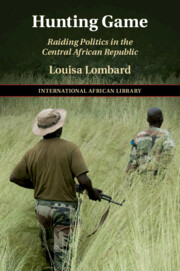Book contents
- Hunting Game
- The International African Library
- Hunting Game
- Copyright page
- Contents
- Figures
- Maps
- Acknowledgements
- Abbreviations and acronyms
- Map
- 1 Force, status, and uncertainty in the arts of acquisition
- 2 Zariba contests and collaborations
- 3 Manhunts persist in an unfortunate colony
- 4 Big-game hunting and regulatory sociality
- 5 The limits of law in coercive conservation
- 6 Camouflage skills
- 7 Denunciation and liberty
- 8 Force and status in rebellion
- 9 Sovereignty and distribution amid forceful acquisition
- References
- Index
- Titles in the series
2 - Zariba contests and collaborations
Published online by Cambridge University Press: 20 April 2020
- Hunting Game
- The International African Library
- Hunting Game
- Copyright page
- Contents
- Figures
- Maps
- Acknowledgements
- Abbreviations and acronyms
- Map
- 1 Force, status, and uncertainty in the arts of acquisition
- 2 Zariba contests and collaborations
- 3 Manhunts persist in an unfortunate colony
- 4 Big-game hunting and regulatory sociality
- 5 The limits of law in coercive conservation
- 6 Camouflage skills
- 7 Denunciation and liberty
- 8 Force and status in rebellion
- 9 Sovereignty and distribution amid forceful acquisition
- References
- Index
- Titles in the series
Summary
At the end of the nineteenth century, the Islamic frontier and the European colonial frontier met in the Central African interior, augmenting each other as well as clashing. The crucial variable was exploitation, not conquest; mobility and freedom from being accosted while collecting valuable goods (if necessary, forcefully) were key to personal advancement and to the political-economic mode of life. ‘Zariba’ is the Arabic term for the enclosures built to contain the goods (slaves, ivory, food, etc.) that the raiders were able to amass. Some zaribas were temporary, while others became more established, morphing into cities. The chapter focuses on some of the key people involved in these raiding projects to show the personal orientation and skills they developed and the kinds of encounters and confrontations they navigated as they attempted to claim privileged status, or to undermine another’s status. By the early twentieth century, French colonial officials had become leaders in forceful acquisition, either co-opting or eliminating most of their challengers. While the French colonial government saw itself as replacing the acquisition-oriented polities with one geared towards production and the management of people, the French operated in a context of penury, and, as a result, their imposition of a state-bureaucratic form ironically entrenched forceful acquisition as a tactic of rule and profit. Raiding and acquisition retained their prominence less because they expressed values than because they were an improvised response to conflicts of values between people with competing claims and interests.
- Type
- Chapter
- Information
- Hunting GameRaiding Politics in the Central African Republic, pp. 40 - 59Publisher: Cambridge University PressPrint publication year: 2020



